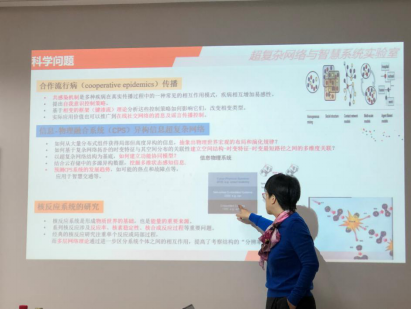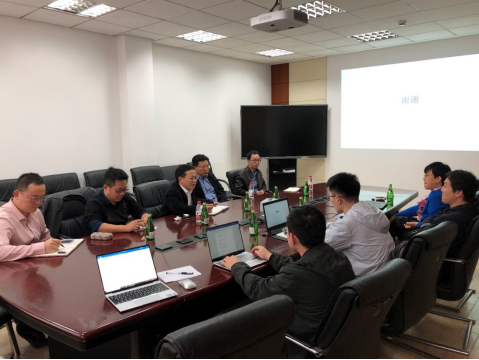On November 22, 2019, a delegation from the Zhejiang Ninghai Big Data Center visited the Complex Network Science and Intelligent Systems Laboratory to engage in in-depth discussions on potential collaborative research directions.
Professor Han Dingding, the head of the laboratory, provided a brief overview of the lab's fundamental objectives and its development trajectory. The laboratory's primary research areas include: complex network modeling and big data analysis, complex network dynamics, cutting-edge interdisciplinary research combining network dynamics and machine learning, and critical technologies and demonstration projects for AI-powered smart cities. Professor Han also highlighted several major scientific challenges faced by the lab, such as the power-law nature of network science, practical network engineering applications for specific systems, algorithms and designs for complex networks, the universality and variability of network dynamics, network information mining, spatiotemporal networks and "networks of networks," micro-level individual definitions in highly heterogeneous networks, and theories on the self-organized evolution of networks.
Professor Han outlined the overarching goal of the laboratory's key project on developing and applying core technologies for the cyber-physical integration of smart cities. This goal aims to establish a bottom-up approach to implementing project outcomes on the OneNet cloud platform. With the aim of achieving collaborative control for smart cities, the project aspires to formulate standardized practices and achieve demonstrable applications. However, Professor Han noted that a major challenge lies in achieving coordinated control of the entire network architecture, which involves addressing complexities, diversity, variability, and other difficulties.
Following an introduction to the development of the mobile IoT platform, Professor Han explored the prospects of various applications, including smart fire prevention, smart transportation, and smart industrial parks. He emphasized that the expected benefits of these applications would extend beyond commercial value to include management value, offering potential contributions to sustainable development—an outcome well worth anticipating.

The meeting also included discussions on the primary business needs of the Ninghai County Big Data Development Service Center. As a pilot county for smart city initiatives, Ninghai County enjoys unique advantages: robust urban infrastructure, well-organized systems, and significant value for its consumer base. For Ninghai County, the benefits of smart city applications are manifold: visualization platforms facilitate effective communication within and outside industries, predictive functionalities enhance urban management, and the OneNet cloud platform simplifies data processing.
Participating scholars generally agreed that breaking down data silos, achieving system integration, and eliminating barriers to data accessibility are critical and necessary steps. At present, the most pressing and challenging issue in the field of smart city applications is the lack of standards. Moving forward, efforts must be focused on addressing this critical gap to ensure the sustainable and effective development of smart city initiatives.

